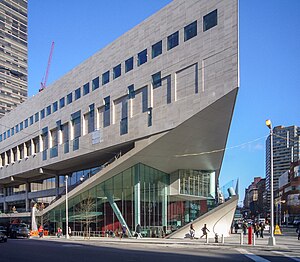The Juilliard School
| The Juilliard School | |
|---|---|

Alice Tully Hall in the Juilliard School building
|
|
| Location | |
| New York City | |
| Information | |
| Type | Private |
| Established | 1905 |
| President | Joseph W. Polisi |
| Enrollment | Approximately 850 college, approximately 290 pre-college |
| Campus type | Urban |
| Website | www |
The Juilliard School (/ˌdʒuːliˈɑːrd/) located in the Lincoln Center for the Performing Arts on the Upper West Side of Manhattan, New York City, is a performing arts conservatory established in 1905. It is informally referred to as Juilliard (/ˈdʒuːliˌɑːrd/). The school trains about 850 undergraduate and graduate students in dance, drama, and music. It is widely regarded as one of the world's leading music schools, with some of the most prestigious arts programs. In 2016, QS Quacquarelli Symonds ranked it as the world's best institution for Performing Arts in their inaugural global ranking of the discipline.
In 1905, the Institute of Musical Art, Juilliard's predecessor institution, was founded on the premise that the United States did not have a premier music school and too many students were going to Europe to study music. The Institute opened in the former Lenox Mansion, Fifth Avenue and 12th Street, on October 11. It moved in 1910 to 120 Claremont Avenue in the Morningside Heights neighborhood of Manhattan, onto a property purchased from Bloomingdale Insane Asylum. In 1920, the Juilliard Foundation was created, named after textile merchant Augustus D. Juilliard, who bequeathed a substantial amount of money for the advancement of music in the United States. In 1924, the foundation purchased the Vanderbilt family guesthouse at 49 E. 52nd Street and established the Juilliard Graduate School. In 1926, the Juilliard School of Music was created through a merger of the Institute of Musical Art and the Juilliard Graduate School. The two schools shared a common Board of Directors and President (Columbia University professor John Erskine) but retained their distinct identities. The conductor and music-educator Frank Damrosch continued as the Institute's dean, and the Australian pianist and composer Ernest Hutcheson was appointed dean of the Graduate School. In 1937, Hutcheson succeeded Erskine as president of the two institutions, a job he held until 1945. In 1946, the Institute of Musical Art and the Juilliard Graduate School completely merged to form a single institution. The president of the school at that time was William Schuman, the first winner of the Pulitzer Prize for Music. Schuman established the Juilliard String Quartet in 1946 and the Dance Division in 1951, under the direction of Martha Hill.
...
Wikipedia
